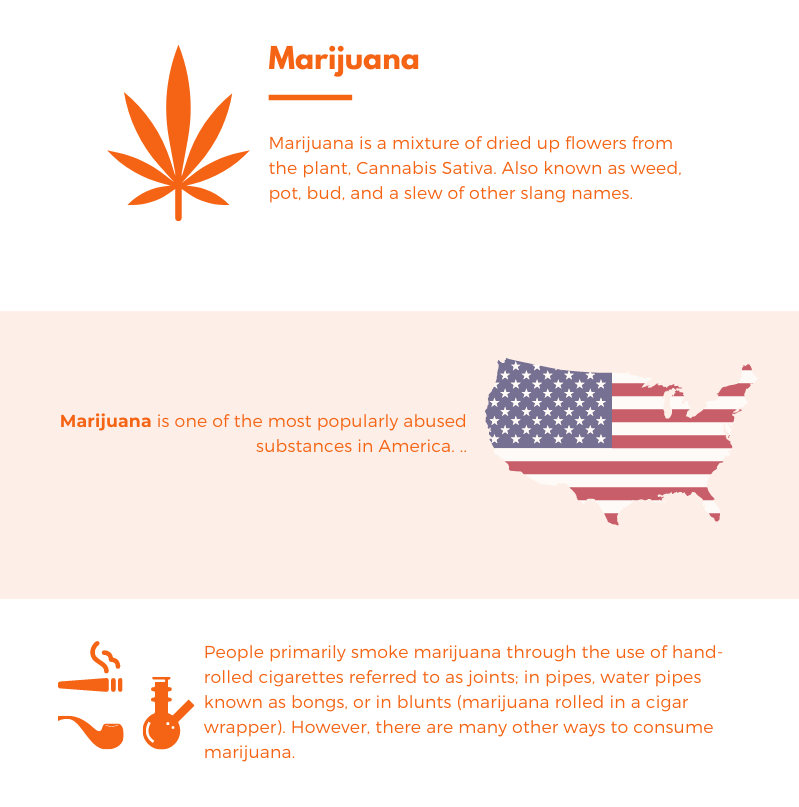Marijuana is a controversial drug that continues to receive more attention as states throughout the U.S. legalize marijuana for medical or recreational purposes. While marijuana use is not considered to be as life-threatening as heroin or cocaine use, the long term effects of marijuana use are significant concerns that are widely debated. Many advocates of medicinal marijuana say it has little to no long term effects, while opponents say the long term effects of marijuana can be addictive and severe. Consequently, many wonder, exactly how addictive is marijuana?
History of Marijuana
Marijuana is one of the oldest substances known to mankind. Dating back as far as 12,0000 years ago, it is believed that cannabis plants first evolved in central Asia on the lands populated by many hunter and gatherer tribes. The use of commercial and psychoactive cannabis then spread to Africa, the Middle East, and Europe. Furthermore, the history of marijuana within the United States began by the late 1800s when cannabis extracts were sold in pharmacies and doctors’ offices to treat stomach problems and other ailments.
It wasn’t long before scientists discovered that THC was the source of not only the medicinal properties of marijuana but the psychoactive compound responsible for the mind-altering effects as well. In the U.S. marijuana was not commonly used for recreational purposes until the early 1900s during the years of the Mexican Revolution. Immigrants from Mexico introduced the recreational practice of smoking marijuana to the American culture.
While marijuana is still illegal on the federal level, it remains the most widely used drug among Americans. Legal marijuana alternatives, such as delta-8 THC, have even been introduced to the market and are extremely popular among young people who live in states where marijuana is still illegal. These alternatives produce effects similar to marijuana and contain trace amounts of THC, the active chemical in marijuana, so people can still fail a drug test after taking marijuana alternatives like delta-8. As of 2022, recreational marijuana is only legal in 21 states.

Is Marijuana Addictive?
The great debate still remains: Is marijuana addictive? If so, how addictive is marijuana? This question poses a controversial debate amongst addiction research and healthcare communities. Recent data suggests that 30% of individuals who use marijuana may have a degree of marijuana use disorder. Furthermore, people who use marijuana before the age of 18 are four to seven times more likely to develop a marijuana use disorder than adults.
The psychoactive component of marijuana is delta-9-tetrahydrocannabinol, also known as THC. When a person smokes marijuana, THC enters the bloodstream, through the lungs, where it then travels to the brain. The absorption process of THC often takes 30 minutes to one full hour before the user experiences a “high”. Compared to other drugs, this is a much slower process. However, if a person ingests marijuana the high takes effect much faster.
Signs of marijuana use and abuse often include:
- Red eyes
- Excessive eating or snacking outside of regular meal times
- Diminished performance in school, work, and other responsibilities
- Isolation
- Disruption in sleep patterns
- A strong odor of marijuana on clothing and/or hair
- A disconnected state (dissociation)
- Lightheadedness/drowsiness
- Excessive coughing
- Paranoid thoughts
- Exacerbated symptoms of co-occurring disorders such as anxiety, borderline personality disorder, and depression
Marijuana use activates receptors in the brain that may cause symptoms such as impaired movement and memory, difficulty thinking, altered sense of time and sight, as well as behavioral and mood changes. Smoking marijuana can also affect your cognitive function and cause harmful cardiovascular effects, such as high blood pressure and worsening respiratory conditions. Marijuana has a central nervous system (CNS) depressant effect. In other words, when used in conjunction with other CNS depressant substances – marijuana can cause an additive effect.
Risks Associated With Marijuana Addiction
People who smoke or ingest marijuana may build up a tolerance over time. In other words, these individuals will need to use more marijuana to achieve the same desired effect. Over time, this cycle can lead to marijuana addiction and dependence. The brain of an individual using marijuana for an extended period of time will adjust to having THC. Once the chemical is removed, or the individual attempts to stop using the drug, the person will experience withdrawal. Marijuana addiction occurs once the person’s body is both physically and psychologically dependent on marijuana. Despite negative consequences, the individual will feel they need marijuana to survive and is not likely to quit without the assistance of a drug rehab program. So, when it comes to determining how addictive marijuana is, it depends on the individual and how they respond to the effects of the drug.
A common misconception of marijuana addiction is that there are no negative physical side effects. However, there are physical risks associated with marijuana abuse – much like that of an average cigarette smoker. Some of the consequences associated with marijuana addiction include:
- Chronic anxiety
- Depression
- Mental impairment
- Risk of lung cancer and other cardiovascular issues
- Decreased energy
- Increased heart rate
- Withdrawal
- Disruption in sleep patterns
- Increased risk of heart attack
Marijuana Treatment Process at PAX Memphis
For some, we know how marijuana is addictive. At PAX Memphis Recovery Center, we understand there is no one-size-fits-all solution to marijuana addiction. In fact, we believe in creating an individualized, comprehensive treatment plan fit to cater to the needs of each client that walks through the doors of our facility. In order to achieve the most effective results of addiction treatment, marijuana rehab must be tailored to the needs of each individual. Marijuana rehab at PAX Memphis generally involves four phases: medical evaluation, detoxification, addiction treatment, and aftercare. Our compassionate team of addiction professionals will work with you every step of the way. From various therapy options to restoring your health, we pride ourselves on helping each individual cultivate a foundation for continuous sobriety and a fulfilling lifestyle in recovery.
If you or a loved one is struggling with marijuana addiction and you don’t know how to overcome it, give us a call today!
Medically Reviewed: September 25, 2019

All of the information on this page has been reviewed and verified by a certified addiction professional.










